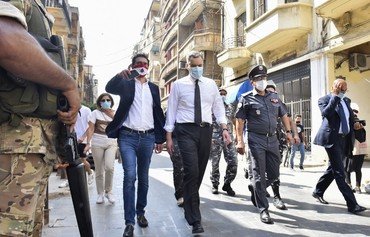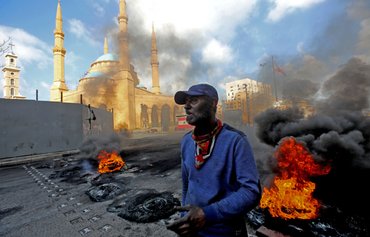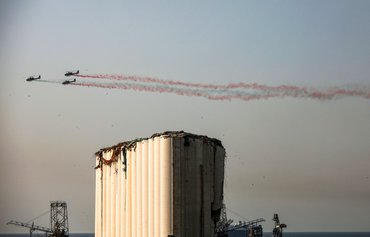French President Emmanuel Macron pressed his drive for political change in Lebanon Tuesday (September 1st), as the former French mandate marked its centenary while teetering on the brink of the abyss.
Macron has set an ambitious goal for his second visit since a deadly August 4th explosion ravaged Beirut: to press for change without being seen as a meddler.
He kicked off his trip on Monday, not by visiting political leaders, but by spending more than an hour with singing legend Fairuz, who at 85 is a rare unifying figure in Lebanon.
Macron ticked off more symbols to mark 100 years Tuesday since French mandate authorities proclaimed the creation of Greater Lebanon.
In the Jaj forest north-east of Beirut, he planted a cedar tree -- Lebanon's national symbol -- to express "confidence in the future of the country", his office said in a statement.
The French air force flew overhead leaving a trail of red, white and green smoke -- the colours of the country's flag.
Lebanon "will be able to rise again", Macron later said in a post on Twitter.
Macron then returned for a second visit to Beirut port, ground zero of the colossal blast that killed more than 180 people, wounded at least 6,500 others and laid waste to entire districts of the capital.
He oversaw the distribution of aid from the French helicopter carrier Tonnerre which arrived in Beirut on August 14th.
Macron also met with some 400 French soldiers working with the Lebanese army to clear thousands of tonnes of debris from the port, vital for a country whose food is 85% imported.
October aid conference
The Beirut explosion compounded Lebanon's worst economic crisis since the 1975-1990 civil war, with a UN agency warning on Sunday that more than half of the population risk a food crisis by the end of the year.
It caused up to $4.6 billion worth of damage and a blow to economic activity of up to $3.5 billion, according to a World Bank assessment.
On August 9th, the international community pledged 252.7 million euros (around $300 million) in emergency aid during a video conference jointly organised by France and the UN.
Macron said Tuesday that he is ready to host a second aid conference for Lebanon next month.
"I am ready for us to organise, maybe around mid or late October, another international support conference with the UN," he said after meeting UN representatives and local aid groups in Beirut.
Later on Tuesday, Macron will meet with under-fire political leaders widely blamed for the explosion, which was caused by a stockpile of ammonium nitrate fertiliser that had languished in the port for years.
Macron, who upon arriving on Monday called for a so-called "mission government", has said his position towards Lebanon's political establishment "is unchanged: demanding without interfering".
This is why he said it was not his place to "approve" of Monday's designation of Mustapha Adib as prime minister.
But Adib, a little known 48-year-old diplomat who since 2013 had served as Lebanon's ambassador to Germany, "has to be given all the tools to succeed... so he can implement reforms" long demanded by the international community, Macron said on Tuesday.

![Alpha jets of the Patrouille de France release smoke in the colours of the Lebanese flag while flying over Beirut on September 1st, as the former French mandate marked its centenary while teetering on the brink of the abyss. [Joseph Eid/AFP]](/cnmi_am/images/2020/09/01/25850-Lebanon-Beirut-centenary-600_384.jpg)






